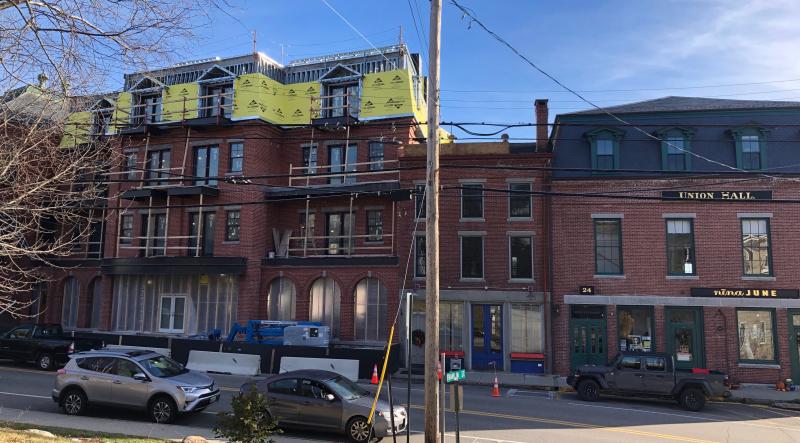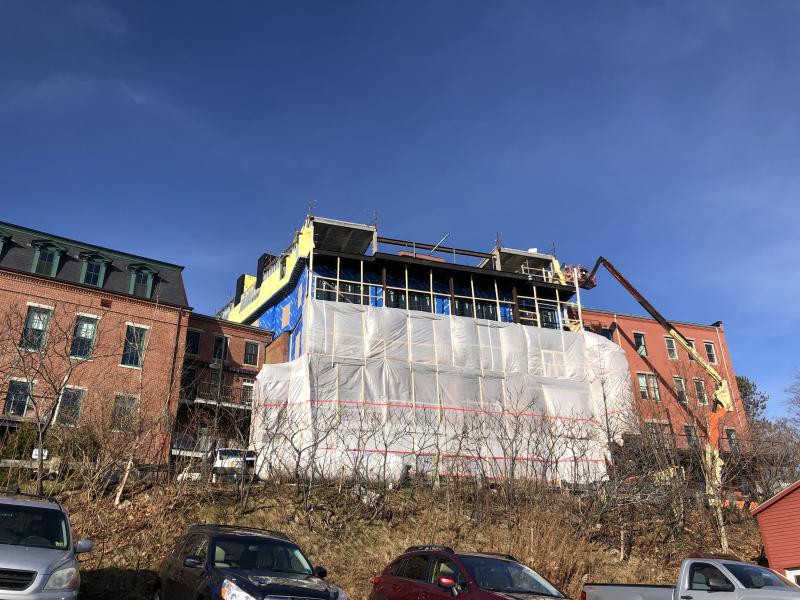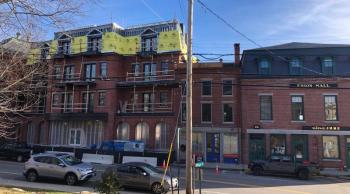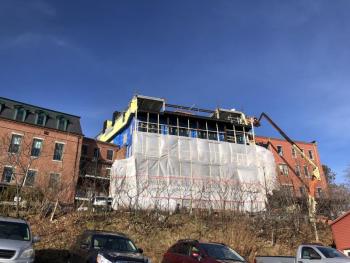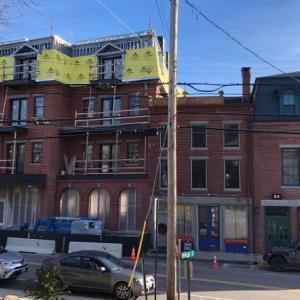Judge vacates Rockport Village hotel building permit, sends site plan application back to Planning Board
ROCKPORT —In a three-count judgment issued Jan. 3, Knox County Justice Bruce Mallonee has directed the Rockport Planning Board to reconsider a site plan application for a new Rockport hotel, which is currently well under construction, and reversed approval of the hotel’s building permit.
The judgment follows his Dec. Dec. 1 order remanding the town’s approval of a new hotel in Rockport Village back to the Rockport Planning Board to address parking issues and the architectural harmony of the building. In that decision, he also ordered a Dec. 15 court hearing to discuss further action concerning how town ordinance amendments passed at the 2020 Town Meeting affected the hotel’s building permit.
See attached PDF for the Jan 3. judgment
In his Jan. 3 judgment, Justice Mallonee said that the amendments approved at an August town meeting in 2020 by voters did, in fact, apply to the 20 Central LLC hotel project.
Those amendments reduced the number of rooms allowed in Rockport downtown hotels to 20, and stipulated traffic studies.
In his judgment, he reversed the approval of a building permit issued by the Rockport Code Enforcement Officer, and its subsequent approval by town’s Zoning Board of Appeals last winter.
He did not, however, impose an injunction that would prohibit the town from permitting further work on the hotel pending reconsideration of the site plan by the Planning Board, and reconsideration of the building permit by the CEO.
In a footnote to that latter decision, he wrote: “In light of the court’s entry of declamatory judgment in Count I and the relief granted pursuant to run 80B, the court sees no need to grant injunctive relief. To the extent Plaintiffs seek to enjoin the actions the Town, the court notes, ‘the strong policy of judicial restrain in mandating the activities of a coordinate branch of government.’”
In that quote, he was citing a 1982 lawsuit involving the Town of Lyman, and quoted again the same sentiment, citing a 2001 case of Great Northern Paper vs. the Penobscot Nation.
“Instead, the court generally ‘operate[s] on the assumption that responsible governmental officials will comply with the law once it is declared,’” he wrote.
But, he added, if the town of Rockport or 20 Central LLC fail to comply with the court judgment, the plaintiffs, “may return to the court and request further relief.”
The plaintiffs who have pursued legal action against the hotel’s construction include Rockport citizens as well as a group that calls itself Friends of Rockport.
They are all represented by Attorney Kristin Collins, who said Jan. 3 in a statement: “The developer will also have to request review of an amendment to the site plan to address the reduction from 26 to 20 rooms. This will provide an opportunity for the Planning Board to consider whether the removal of 10 rooms from the developer’s initial building design can provide the opportunity to preserve the harbor views from Goodridge Park and Central Street.”
She added: “My clients are encouraged by this ruling and sincerely hope that the developer and the Town will approach this further review process with the aim of better addressing this project’s impacts on the neighborhood.”
Both the hotel owners and the hotel opponents have already said they would pursue Maine’s highest court, the Judicial Supreme Court, should their interests not be satisfied.
Justice Mallonee has been well aware of that, and said at a Dec. 15 hearing: “I’ve got to get you a final judgment so that you can respond with any motions that you think might be necessary, and to have some kind of combined deliberative process with both completing the judgment and addressing the post-judgment type arguments that have been presented, I think it is going to make it unwieldy and unclear. I want to make sure that when we get to the point when I am actually drawing a double line, there’s no ambiguity about what has been ruled on and what sequence.”
In his Jan. 3 judgment, Justice Mallonee set deadlines for further pleadings, with motions to be filed no later than Jan. 17. Any responses to those motions are to be filed no later than Jan. 31, and reply memoranda must be filed no later than Feb. 7.

